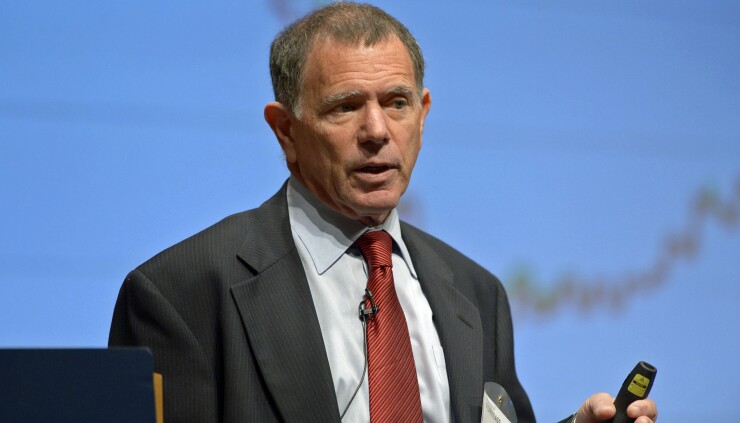The failures of
That lack of clarity led UCLA Anderson Forecast economists to provide a dual forecast in the quarterly report they released Wednesday: one where a recession lies ahead and one where it doesn't, a maneuver it also used when it issued its previous
"What is happening at Silicon Valley Bank is on everyone's mind," said Anderson Forecast Director Jerry Nickelsburg, which is why he turned to UCLA's finance department for additional insight.

The feedback from Barney Hartman-Glaser, associate professor of finance at the UCLA Anderson School of Management and director of research for the UCLA Ziman Center for Real Estate, raised more questions.
"It's still early, and we have one data point," Hartman-Glaser said. "Using the systemic risk exemption to cover deposits for Silicon Valley Bank is big news."
The Federal Deposit Insurance Corp. announced on Monday it would employ the systemic risk exemption for both Silicon Valley Bank and Signature Bank, which allows the FDIC to guarantee all of the banks uninsured deposits, rather than the standard cap of $250,000 per customer.
Hartman-Glaser said he can't assess at this point what the eventual fallout will be like.
"Let's hope it's limited," Hartman-Glaser said. "The question our finance faculty has raised: Is this like when the long term capital-big bank institutions failed in 2008, and were bailed out and the economy chugged along until the 2011 recession; or is this Bear Stearns-Lehman Brothers?
"The answer is, we don't know, and a lot of that depends on what the Federal Reserve does," Hartman-Glaser said. "What it tells us is that we need to watch the way economic events unfold closely to see what the trajectory will be."
The bank failure also raises questions about the general economic health of Silicon Valley, a significant economic engine for California.
The bank's collapse marks another pain point for tech-dependent economies that were already struggling, said Lisa Washburn, managing director for Municipal Market Analytics.
"I think this could result in more softening in those economies, more than the general U.S. economy," Washburn said.
"There are going to be jobs that are lost and money that's not going to be available, and that will have a dampening effect on those economies," she said. "It was already a really difficult market for those in the tech industry."
California economists, including Nickelsburg and Christopher Thornberg, founder of Beacon Economics, say the state's tech industry continues to show strength despite layoffs announced at Twitter, Google, Salesforce and Meta. On Tuesday, Meta CEO and Mark Zuckerberg announced in a Facebook post that an additional 10,000 people would be laid off and 5,000 open positions frozen.
"The ballooning tech layoffs are not the canary in the coal mine," Nickelsburg said during Wednesday's presentation.
"If you look at technology in California, tech employment is going up," he said.
"The professional, scientific and technical services sector, a tech intensive sector containing many of the firms announcing layoffs, hit record levels of payroll employment in the fourth quarter of 2022," Nickelsburg wrote in his forecast. "The layoffs might be happening, but in California, the state's portion of the 100,000 jobs cited in the New York Times article have been replaced by new hiring."
The mature multinational firms are doing layoffs that are spread out across the country and the globe, but the people laid off in California are being absorbed by smaller startup tech firms, he said.
"2021 was a banner year for venture capital," Nickelsburg said. "In the fourth quarter, early stage funding held up, but late stage firms were at a four-year low for venture capital. That is where the stress is. But so far, it looks like tech is holding up."
Many of those venture capital firms and the startups they backed were
Nickelsburg said he doesn't know what the ultimate impact from Silicon Valley Bank's failure will be, but noted that the venture firms' deposits were ultimately guaranteed by the FDIC.
The recent big-firm layoffs "might be an indication of a contraction overall in tech, but the data do not show it yet," he said.
"One key difference between projected future layoffs in tech today and those in 2001 is that today, tech is embedded in more sectors and there exists a higher probability that green tech and the like will be able to absorb those layoffs," he wrote.
For all of the layoff announcements in Silicon Valley, unemployment
"Venture capital in 2022 was down 25% from 2021, but it was a third higher in 2021 than it had ever been before," Thornberg said. "Let's acknowledge 2021 was different."
"There have been a few crashes, but how could there not be there," he said. "They inflated the sector like nobody's business in 2021. But it didn't go on long enough to do any structural damage."
Tech is "still the 800-pound gorilla of growth in San Jose," he said.
Marc Joffe, a Cato Institute federalism and state policy analyst, said the bank failure is likely to affect the local economy because the disappearance of the bank will curtail its lending and other client services.
"Also, the failure seems to me to be a symptom of a larger problem: a possible breakdown of the startup ecosystem up here," said Joffe, who resides in the Bay Area.
He added that he thinks only a venture capitalist would fully understand the implications, but it will be harder for the industry because it's losing a bank that understands how it operates.
"I don't think tech is as important as Wall Street is to New York City's economy, but I think from a tax revenue point of view it's extremely important, because of the number of high revenue salaries," Joffe said. "The health sector employs more people, but I suspect they don't have the high salaries that drive state revenue."
The state's tax revenue is heavily weighted toward capital gains and income taxes from high earners.

Most of the uncertainty as to whether the state and nation are headed for a recession lies in tracking what the Fed will do and how that will impact the economy, UCLA Anderson Forecast senior economist Leo Fehler said.
"We are presenting two scenarios," Fehler said. "One scenario is no recession, where economic growth slows, but remains positive, inflation ebbs, labor markets remain robust and the Federal Reserve takes a less aggressive approach to monetary tightening policy tightening."
In the second scenario, the Fed forces a mild recession and accepts an economic contraction and higher unemployment to combat inflation, he said.
Trying to predict what the Fed will do when Chairman Jerome Powell has said they "will continue to make decisions meeting by meeting," is challenging, Fehler said.
In February, Powell said
'We have gotten data that came in since Powell's speech," Fehler said. "First, we had the SVB bank collapse, seeing much greater risk in the banking sector, and then inflation data — which is moving in the right direction, but not fast enough. Inflation is continuing to be sticky and continuing to be high, but now the Fed has to deal with financial instability."
He added that the financial markets "are all over the place."
Going by the markets, Fehler said, there was no financial crisis last week, then Monday there was a financial crisis, Tuesday it was averted, and then Wednesday it was back on.
"The data is all over the place and market sentiment is all over the place," he said.
As a result, the Anderson Forecast's no-recession scenario has the Fed stopping to wait for a lot more data to come in to make another move, he said.
In the event the economy navigates a softer landing and avoids a recession, "California grows, and in fact continues to grow faster than the U.S., led by more construction, an ample rainy-day fund for state government, increased demand for defense goods, and increased demand for labor saving equipment and software," Nickelsburg said.
In that scenario, the unemployment rate averages for 2023, 2024 and 2025 are expected to be 4%, 3.9% and 3.6%, respectively.
In the recession scenario, the California economy declines, but by less than the U.S., Nickelsburg said, and unemployment rates for 2023, 2024 and 2025 are expected to be 4.3%, 4.8% and 3.7%, respectively.
Caitlin Devitt contributed to this report.





